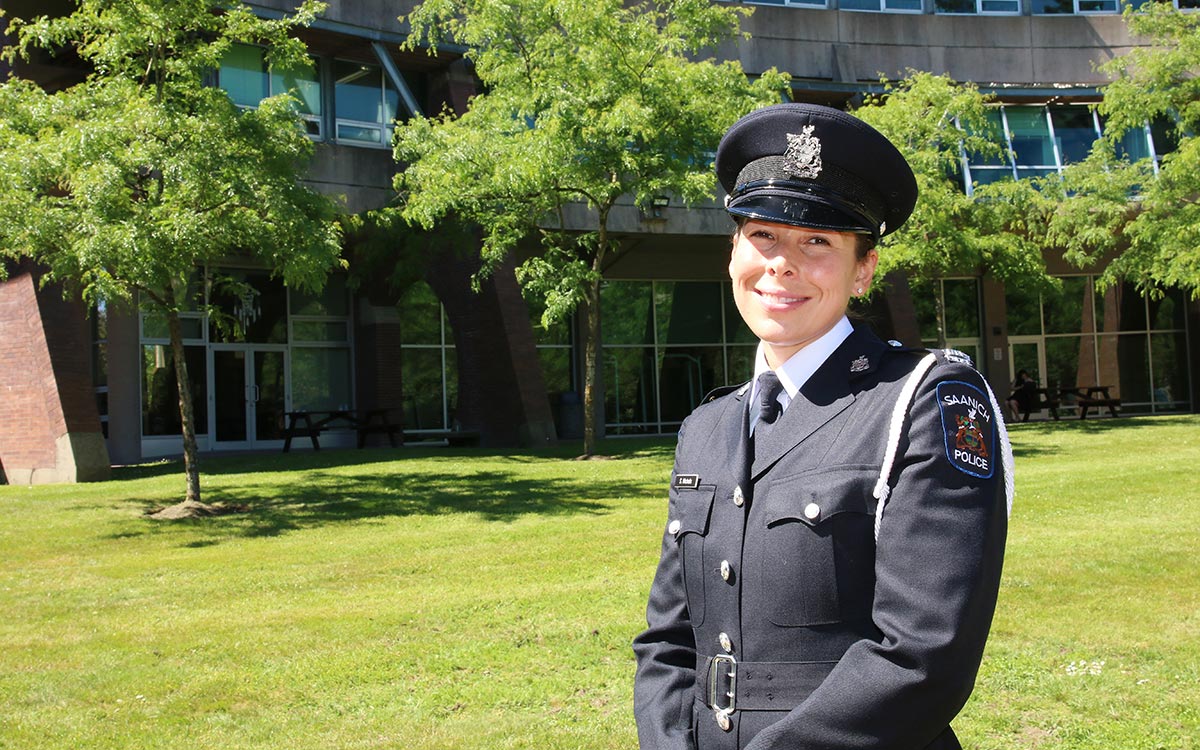When Shauntelle Nichols needed help, the police were there for her. Today she’s a police officer herself, ready to be there for others in need.
For the last several years, Shauntelle has drawn on her experience of officers helping make her feel safe to motivate and inspire her in her studies and efforts to be hired by a local police department.
“Because really, that’s what policing is. You’re at your worst day, somebody’s coming to help you. That’s what’s inspiring to me. I want to be that person [to make others feel safe]. And I see a lot of women, Aboriginal women, Aboriginal youth, in stressful and horrible relationships. They don’t know how to get out and sometimes all it takes is somebody listening, being supportive and being strong for you and guiding you in the right direction.”
It wasn’t long before her personal experience pointed her in the direction of the Justice Institute of British Columbia (JIBC) where she applied to the Law Enforcement Studies Diploma (LESD) program.
“I remember the day I got my acceptance letter I cried my eyes out because I was so happy to be going to this program. It’s the top public safety institution in BC. It’s well known and I knew that if I got in here and I worked as hard as I could it would give me a strong, strong reference to apply to police departments.”
Her hard work paid off. Shauntelle was recognized with awards including the Bob Hull Memorial Award as the top graduating student in the LESD program, as well as the Minerva Foundation Award for Aboriginal Women, both administered by The JIBC Foundation.
I knew that if I got in here and I worked as hard as I could it would give me a strong, strong reference to apply to police departments
With her Coast Salish heritage, she also served as a student representative on JIBC’s Indigenous Advisory Council, which gave her an opportunity to meet with chiefs and elders, and provide insight into how more Aboriginal people can be inspired to choose careers in public safety.
But perhaps her happiest accomplishment was reaching her original goal of being hired as a recruit for Saanich Police Department. It was her first choice due to it being a community-based police department in a small, coastal community, similar to her hometown on the Sunshine Coast but with more opportunities for her young daughter.
Once hired, it was back to JIBC’s New Westminster campus for recruit training at the JIBC Police Academy.
Shauntelle described the LESD program as one that helps students decide whether policing is the right career for them. The Police Academy, on the other hand, is more intense, and focused on teaching recruits what to expect when on patrol every day.
She was a member of the first class to be taught under the Police Academy’s new curriculum which has reduced reliance on classroom lectures in favour of more hands-on scenario-based training. Shauntelle, for one, felt it was an effective way to learn.
“I do feel more prepared because I’ve actually been in situations out in the field during Block 2 where I looked at a situation and felt, ‘I know how to deal with this situation because I dealt with this scenario when I was at Police Academy.’ So I know how to talk to this person, and I know what to expect. For example, different wording you can use on people that might trigger something.”
Through her training, she learned how to approach situations more effectively, essentially getting her practice round out of the way during training instead of while on the job.
“So when I’m on the road, I’m not making that mistake again because I remember when I did that sim this is what I did and this is what happened from it. It really allowed us to explore where our weaknesses are, where our strengths are, and look at it from a different angle. You can see other officers go through it and how they dealt with it. And there’s the debrief so you can talk about it afterwards.”
Their instructors, police officers themselves, provide further context by sharing stories of their own experiences in dealing with similar scenarios. By the end of training, Shauntelle felt comfortable and confident in knowing what to expect on the job.
Now officially Const. Shauntelle Nichols, she is looking forward to her new career and pursuing her goals of working with Aboriginal youth and being a role model for them, as well as helping women end the cycle of domestic violence and emotional abuse. She expressed gratitude that her grandparents taught her the values of integrity, honour, respect, trust and hard work.
“I think that having that at such a young age is what built the path for me to be who I am today and I want to do the same thing for my daughter and other youth.”
For more information on the Law Enforcement Studies Diploma program, visit jibc.ca/lesd.
